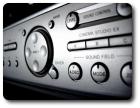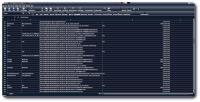 enjoy listening to music, but yet again who doesn’t? There is always catch though — a pitfall if you like: records and files get ‘used up’ after a period of time. Obtaining new music is a time-consuming process whether it involves walking, browsing or loading CD‘s.
enjoy listening to music, but yet again who doesn’t? There is always catch though — a pitfall if you like: records and files get ‘used up’ after a period of time. Obtaining new music is a time-consuming process whether it involves walking, browsing or loading CD‘s.
Since peer-to-peer (P2P)) downloads are illegal, I have been downloading a lot music from small bands’ Web pages en masse. What I do not like, I can immediately dispose of. Using the command line, I am able to download music in the background without any manual intervention, simply by spidering the Internet.
 I have come to realise that I do not know the names of songs that I listen to. I rarely bother to look at the filenames or tags because it is the same time-consuming ‘luxury’ mentioned above. In most cases, I fail to remember the names of bands too. To use an extreme example, a song which I must have listened to 50+ times in past few days has been completely obscure to me up until now. To repeatedly play it, I would typically use the “jump” function followed by the string “
I have come to realise that I do not know the names of songs that I listen to. I rarely bother to look at the filenames or tags because it is the same time-consuming ‘luxury’ mentioned above. In most cases, I fail to remember the names of bands too. To use an extreme example, a song which I must have listened to 50+ times in past few days has been completely obscure to me up until now. To repeatedly play it, I would typically use the “jump” function followed by the string “be” (for the word “belief” contained in the song’s title). This plays the song merely at the power of will, taking no more than a second to find and play it. It all leaves song titles and artists’ names in the dark unfortunately.
While on this issue of ‘music productivity’, XMMS accelerators, for instance, are used to control the music player without changing application focus. In other words, key combinations involving SHIFT, CTRL and/or ALT work universally and affect the player’s state at any time. You can change tracks, adjust volume etc. while in the midst of writing a sentence. The mechanism which enables this is described (also visually) towards the end of an old item about Music Log Files.
I have reached what I consider to be a Utopian situation. This is analogous to have a radio station with infinite supply of music. I have the ability to skip tracks, repeat tracks and organise the music supply at great ease. Moreover, the music supply can be handled purely by robots (cron jobs), as described in an old item on music mass-downloading.

 N excellent and comprehensive review of the iPod nano comes from ars technica. The review is full of clean shots of the nano. To spice things up, the durability of the iPod is put into the test with cars running over, bashes into the ground, etc. I warmheatedly recommend this visually-rich review, which is not vandalistic in nature. The picture shown above is somewhat misleading.
N excellent and comprehensive review of the iPod nano comes from ars technica. The review is full of clean shots of the nano. To spice things up, the durability of the iPod is put into the test with cars running over, bashes into the ground, etc. I warmheatedly recommend this visually-rich review, which is not vandalistic in nature. The picture shown above is somewhat misleading.





 Filed under:
Filed under: 
 AVE you had a peek at the
AVE you had a peek at the 
 enjoy listening to music, but yet again who doesn’t? There is always catch though — a pitfall if you like: records and files get ‘used up’ after a period of time. Obtaining new music is a time-consuming process whether it involves walking, browsing or loading CD‘s.
enjoy listening to music, but yet again who doesn’t? There is always catch though — a pitfall if you like: records and files get ‘used up’ after a period of time. Obtaining new music is a time-consuming process whether it involves walking, browsing or loading CD‘s. I have come to realise that I do not know the names of songs that I listen to. I rarely bother to look at the filenames or tags because it is the same time-consuming ‘luxury’ mentioned above. In most cases, I fail to remember the names of bands too. To use an extreme example, a song which I must have listened to 50+ times in past few days has been completely obscure to me up until now. To repeatedly play it, I would typically use the “jump” function followed by the string “
I have come to realise that I do not know the names of songs that I listen to. I rarely bother to look at the filenames or tags because it is the same time-consuming ‘luxury’ mentioned above. In most cases, I fail to remember the names of bands too. To use an extreme example, a song which I must have listened to 50+ times in past few days has been completely obscure to me up until now. To repeatedly play it, I would typically use the “jump” function followed by the string “ Yahoo have recently introduced nice features such as
Yahoo have recently introduced nice features such as 
 ome weeks ago I wrote about an XMMS extension that I had devised. This collection of steps which I described could make XMMS store
ome weeks ago I wrote about an XMMS extension that I had devised. This collection of steps which I described could make XMMS store 